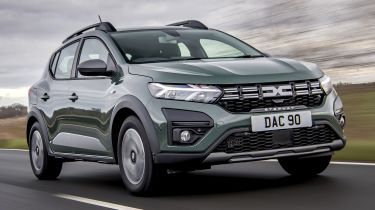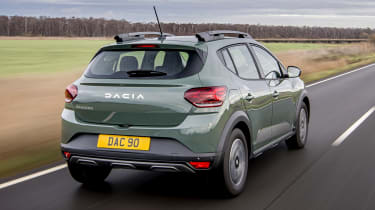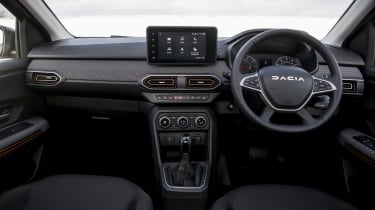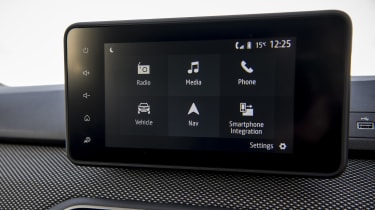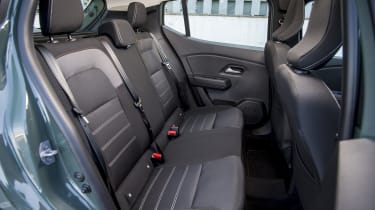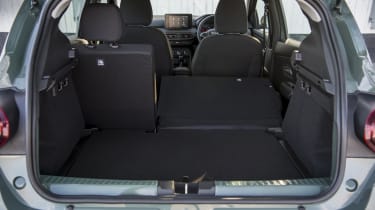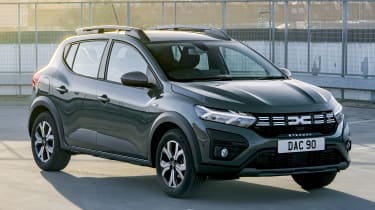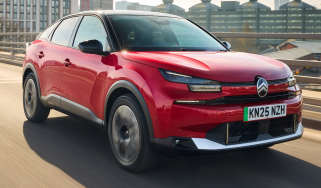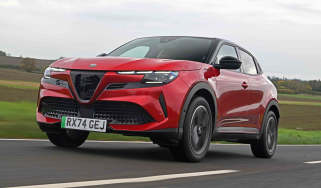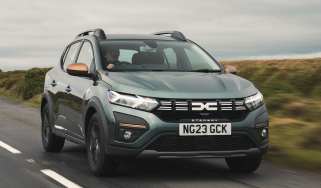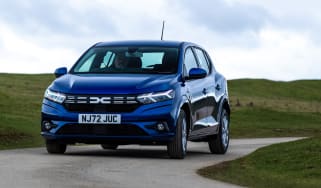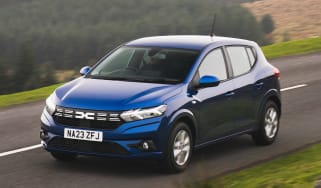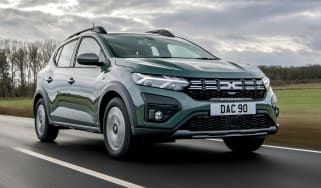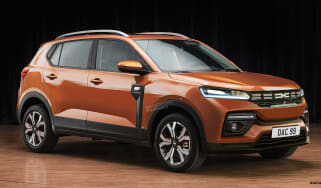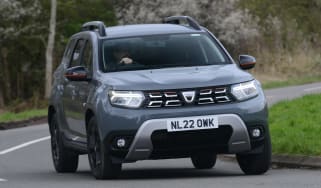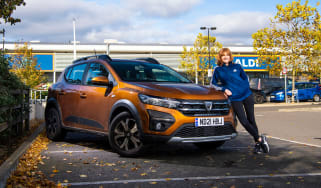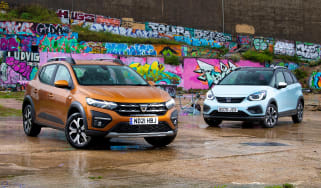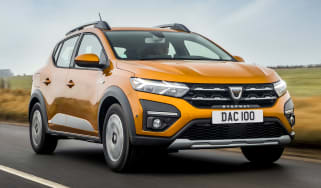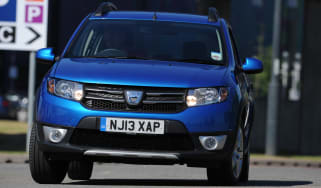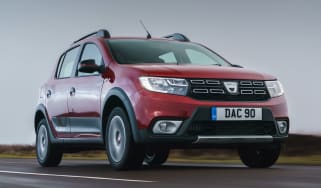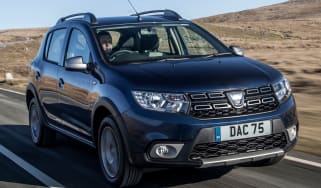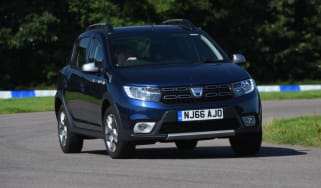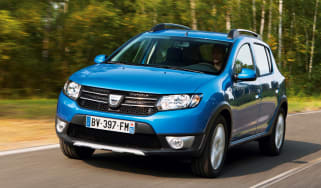Dacia Sandero Stepway review
The Dacia Sandero Stepway adds an essence of SUV style to the budget-friendly supermini

The Dacia Sandero Stepway makes a great case for itself as an urban runabout, with rugged SUV-style looks, plenty of space and low running costs – all for the price of a bog-standard city car. Yes, the bargain basement version of the Sandero supermini grabs more headlines as it remains among the cheapest new cars on sale in the UK, but relatively speaking it doesn’t cost that much more to get the more charming Stepway on your driveway. If you’re in the market for a small family car and think the usual players don’t quite suit your budget, the Sandero Stepway might be the solution.
About the Dacia Sandero Stepway
Dacia launched in the UK in 2013, with the second-generation Sandero supermini and Duster SUV offering virtually unbeatable value to buyers seeking practical, no frills motoring. Of course, there were some downsides for owners of Dacia’s earlier cars to contend with: the rough-and-ready interior, a lack of refinement and the austere image were at odds with the qualities offered by more expensive rivals.
But the Romanian brand, which is owned by Renault, seems to have struck a chord with those who wanted a reliable and functional family car that offered little pretence and plenty of leftover spare cash once the deal was done. Dacia has since proven to be a real success story with its 250,000-plus UK sales demonstrating the lure of a genuine bargain.
The Sandero Stepway maintains the brand’s budget-focused approach, but takes the best bits of the standard Sandero supermini and adds a more rugged SUV-esque look and some charm. The second-generation model was unveiled in 2021 and included revisions that add some extra quality and finesse. Chief among them was an eight-inch infotainment touchscreen for certain versions with built-in sat-nav and smartphone connectivity, while the small SUV got a much sharper look courtesy of a brand-wide facelift for all Dacia’s models.
Used - available now

2022 Dacia
Sandero Stepway
11,351 milesManualPetrol1.0L
Cash £12,945
2022 Dacia
Sandero Stepway
43,517 milesManualPetrol-lpg1.0L
Cash £8,100
2018 Dacia
Sandero Stepway
37,854 milesManualPetrol0.9L
Cash £7,800
2020 Dacia
Sandero Stepway
43,434 milesManualPetrol0.9L
Cash £7,676Engines for the Sandero Stepway include a Renault-sourced, 1.0-litre three-cylinder TCe 90 petrol motor, paired as standard with a six-speed manual gearbox, which is offered with a CVT automatic transmission on range-topping models. If you opt for the niche TCe 100 Bi-Fuel version, you’ll benefit from a petrol/LPG system which is less fuel-efficient but emits less CO2, and does promise reduced running costs thanks to the lower price of LPG fuel.
With just three trim levels to choose from and not many pricey options to consider, configuring your Sandero Stepway should be pretty straightforward. The base Essential-spec goes without alloy wheels and has black exterior trim instead of a body-coloured finish to the mirrors and door handles, while it also lacks the media touchscreen found in higher-spec models. However, the standard kit list does include a DAB radio, Bluetooth, air-conditioning, rear parking sensors and cruise control.
Moving up to the Expression and Extreme specifications brings extras such as keyless entry, a rear-view camera, automatic wipers, Apple CarPlay, Android Auto and blind spot warning. Prices currently start from just over £15,000, rising to around £19,000 if you spring for Extreme trim and the CVT automatic.
Few cars are as keenly priced at the Sandero Stepway, and most of the other toughened-up superminis on the market such as the Ford Fiesta Active have now been discontinued. The Honda Jazz Crosstar is one that remains on sale, but it starts from over £28,000.
The Stepway costs about the same money as the Toyota Aygo X and Fiat Panda – two other 4x4 lookalikes – plus the Suzuki Ignis and MG ZS small SUVs. The Nissan Juke and Renault Captur crossovers are stylish alternatives, although entry-level versions start from close to £21,000 and £22,500 respectively.
Engines, performance and drive
Although the Sandero Stepway is underpinned by the same CMF-B architecture as the Renault Clio, it uses a more rudimentary suspension setup. Ultimately, it doesn’t provide much in the way of driving fun, instead offering a focus on comfort which suits the car’s family bias. If most of your journeys are shorter, urban routes, then the Stepway will be perfectly acceptable transport.
The raised ride height and extra suspension travel helps to smooth out lumps and bumps in the road, but you’ll notice quite a bit of noise in the cabin once up to speed, likely due to a lack of sound deadening in the Stepway compared to rivals.
We prefer the combination of the TCe 90 petrol engine and six-speed manual transmission, opposed to the CVT auto. There might only be 90bhp on tap, but the Stepway weighs in at just over a tonne so it manages to offer adequate performance.
0-62mph acceleration and top speed
Straight-line performance isn’t the Stepway’s strongest trait, with the quickest version – the TCe 100 Bi-Fuel – managing 0-62mph in 11.9 seconds and a 109mph v-max. The TCe 90 petrol (six-speed manual) car is only slightly behind on 12.0 seconds, while choosing the CVT version means a rather pedestrian 14.2-second sprint to 62mph.
In-gear acceleration is also quite lethargic: 50-75mph, in 4th gear, takes just over 10 seconds for both the Bi-Fuel 100 and manual TCe 90 versions, with the CVT auto lagging behind on 12.6 seconds.
It feels like the TCe 90’s turbocharger does most of the heavy lifting for the 1.0-litre three-cylinder engine. Beneath 2,000rpm the motor can be slow to respond, while revving it all the way to the 6,000rpm redline is a fruitless endeavour. You need to get used to working the gearbox if you want to keep the Stepway in its preferred power band.
MPG, CO2 and running costs
If there’s one area where Dacia’s cars really shine it’s running costs. Even though Dacia managed to increase standard kit and overall quality for the third generation Sandero Stepway, it’s still one of the cheapest cars on sale in the UK, starting from a touch over £15,000. A further £1,000 buys you the Expression model which is flush with kit and yet still remains much, much cheaper than its rivals.
The TCe 90 six-speed manual variant is fairly efficient on paper, with Dacia claiming 50.4mpg on the combined WLTP test cycle. That said, we averaged 38.6mpg after covering more than 4,500 miles in our manual Sandero Stepway long-term test car. CO2 emissions stand at 127g/km, which means business users will currently pay a 30 percent Benefit-in-Kind company car tax rate.
You can get the top-of-the-range Extreme model with a CVT auto, but this particular version will only achieve 45.6mpg at best and it emits 140g/km of CO2.
According to Dacia, the Sandero Stepway powered by the TCe 100 Bi-Fuel engine is capable of 48.7mpg, and will emit 131g/km of CO2 when running on petrol or 115g/km if you use LPG.
Insurance groups
Opting for the entry-level Essential version, with either the TCe 90 or TCe 100 Bi-Fuel engine, sees an insurance group of 12, so premiums shouldn’t prove to be too costly. Expression trim models sit in group 13, while Extreme-spec ups it to group 14 if you stick with manual transmission. Oddly, the Extreme version equipped with the CVT auto models occupies group 11.
Depreciation
What makes the low prices of the Sandero Stepway range even better is that, after such a reasonable outlay, you’ll be pleased to know that you can expect to see a decent chunk of your money back come resale time. Our latest expert data suggests that, after a typical three-year/36,000-mile ownership period, the Stepway should retain an average of 53 per cent of its original list price. The Extreme TCe 90 six-speed and TCe 100 Bi-Fuel versions are expected to perform better still, retaining about 55 per cent of their value after 36 months of ownership.
To get an accurate valuation on a specific model check out our free car valuation tool...
Interior, design and technology
The jacked-up Sandero Stepway was already a pretty decent looking car, with its raised ride height and faux-SUV addenda helping it stand out from its supermini sibling. Then Dacia gave all of its cars a mild facelift in 2022, including a sharper look for the front end and the Romanian brand’s new logo.
The large grille and relatively slim, angular-shaped headlights look modern, while the roof rails, front and rear faux skid plates, side protection stickers and wheel arch cladding, help give the Stepway a more rough-and-ready look.
Inside, you’ll notice some soft-touch fabrics are present and work hard to soften the dark appearance, but harder plastics still rule the cabin. They give the cabin a durable quality though, and we like that Dacia is sticking with simple, chunky dials for the climate control. The copper/orange air-vent trim also looks smart, complemented by stitching of the same colour across the front seats.
Standard kit for entry-level cars is reasonable, but the step-up to Expression trim brings fabric upholstery on the dash, a much nicer soft-touch steering wheel, a reversing camera, keyless entry, a removable smartphone holder and an eight-inch touchscreen that includes Apple CarPlay and Android Auto.
Top-spec Extreme models get copper-brown accents, 16-inch alloy wheels (rather than the steel versions for Essential and Expression versions), automatic air-conditioning and wipers, all-round parking sensors and sat-nav built-in.
Sat-nav, stereo and infotainment
There’s no touchscreen in the most basic Sandero Stepway, instead you just get DAB radio, Bluetooth, four speakers and a smartphone cradle. Expression and Extreme-spec models both come with a high-set eight-inch touchscreen. It’s smaller than the portrait screen you’ll find in the Renault Clio, but it has all the connectivity that you could need and looks impressive in the Sandero.
Smartphone mirroring is available via Apple CarPlay and Android Auto, both of which require a wired connection. You’ll find the socket to connect your phone to either system set high on the dashboard, behind the smartphone cradle, with the other one lower down only able to charge devices.
The infotainment system is very basic, with the homepage comprising six tiles making it easy to find the few functions the Dacia system does feature. The resolution of the eight-inch display is decent and it responds reasonably quickly to inputs, although the lack of any physical shortcut buttons is a little frustrating. There are audio controls behind the steering wheel though.
Practicality, comfort and boot space
Despite the Sandero Stepway’s budget-focused nature, you don’t feel like you’re in the cheap seats while sitting up front, especially in the higher-spec versions. The seats are comfortable and the fit and finish is much improved over the previous model.
The driving position is somewhere in between a traditional supermini and an SUV because you sit quite upright, while Expression trim and above adds a reach- and rake-adjustable steering wheel. Visibility overall is excellent and we like the useful USB socket located just behind the dash-mounted smartphone holder, which means you don’t have messy wires trailing through the cabin.
Extreme models get more practical kit, including a high central armrest with extra storage, automatic air-conditioning and front and rear parking sensors. Dacia does offer a spare wheel as an option rather than the foam repair kit that comes as standard, plus accessories like roof boxes, bicycle racks and tow bars.
Size
The Sandero Stepway measures 4,099mm in length, 1,848mm wide (excluding door mirrors) and stands 1,535mm tall, which makes it only a little bigger than its Sandero sibling. Just for further comparison, a Nissan Juke is 111mm longer and 58mm taller, while the Stepway is 48mm wider.
Leg room, head room and passenger space
The Stepway’s slight increase in ride height over the Sandero hatch helps to make access and egress easier. Once inside, the driver and front passenger will find plenty of room to get comfortable and there is adequate space in the back for three extra occupants. During our own testing we found the Stepway provided more overall rear space than its Honda Jazz Crosstar rival.
Boot
With 328 litres of boot space, the Stepway also trumps the Jazz on luggage carrying ability, although it’s slightly more difficult to load heavier items due to the Stepway’s high load lip. The lip is also painted, so will be prone to scratching, although Dacia has the answer in the shape of a stainless steel boot sill accessory. Folding the 60:40 rear seats opens up a more practical boot capacity of 1,108 litres.
Reliability and safety
Reliability shouldn’t prove to be an issue, as the Sandero Stepway sits on a tweaked version of the Renault Clio’s CMF-B platform, sharing much of its tech and is powered by engines from its French parent company.
Unfortunately, Dacia’s cars don't tend to receive the same praise from industry safety experts Euro NCAP as Renault’s. The last two Renaults tested by Euro NCAP both received the maximum five-star rating, while the Dacia Jogger and Spring tested in 2021 were awarded one-star ratings.
To take the Stepway’s own two-star Euro NCAP rating in isolation, and without any explanation, would be a touch unfair on Dacia’s efforts with its small family car. The Stepway actually received a 70 per cent score for adult occupant safety, along with 72 per cent for child passenger protection – both semi-decent scores. However low marks for safety assist tech (42 per cent) and pedestrian protection (41 per cent) mean the overall classification is reduced to two stars.
Not too long ago, Dacia often found itself at the bottom of our best car manufacturer rankings, which is based on owners’ feedback from the Driver Power customer satisfaction survey. However the brand has been performing a lot better recently, and this year jumped to 26th place (out of 32) on the list, ahead of Volkswagen, Ford and even Renault itself. Meanwhile, the Mk2 Dacia Duster managed to finish fourth on our list of the best cars to own, with owners praising its infotainment system and low running costs in particular.
Along with the usual plethora of airbags throughout the cabin, the basic Essential version also features ABS/ESP, an emergency brake assist system, rear parking sensors and cruise control with a speed limiter. Expression-spec cars add a rear-view camera, while Extreme versions add front parking sensors and a blind spot warning.
Warranty
Dacia offers a standard three-year/60,000-mile warranty for the Sandero Stepway, with the option to extend cover for up to seven years at extra cost. The manufacturer also includes a two-year paintwork and six-year anti-corrosion warranty.
Servicing
Dacia recommends annual service intervals for the Stepway, or every 18,000 miles, whichever comes first. Service plans are available to make budgeting scheduled maintenance a little easier: at the time of writing, a three-year/30,000-mile plan costs £576, or £13.99 per month, while a four-year/40,000-mile scheme is priced at £984, or £18.99 per month.
